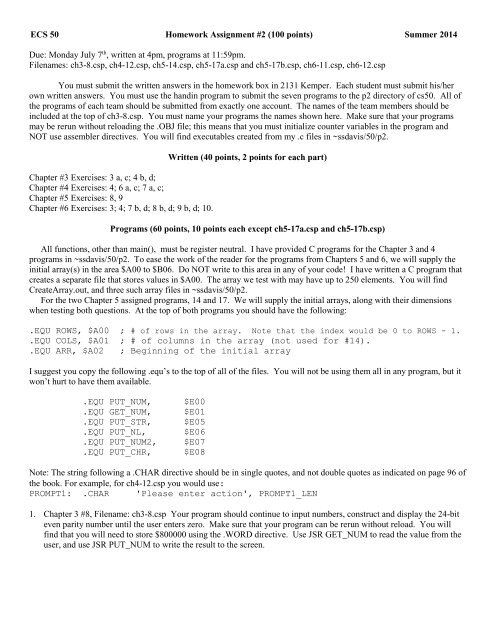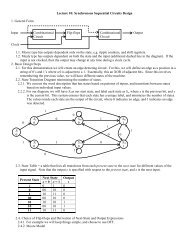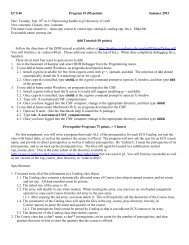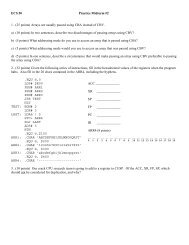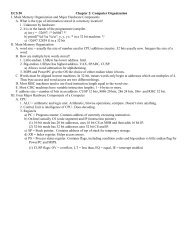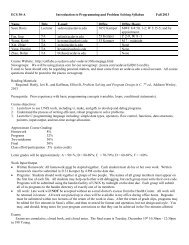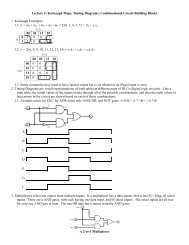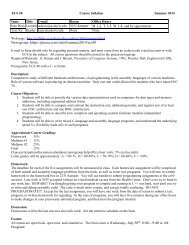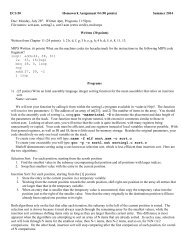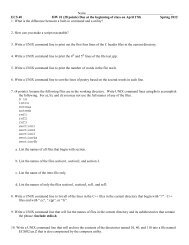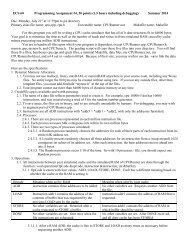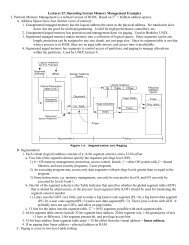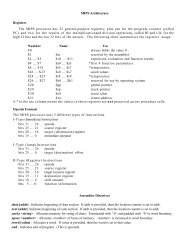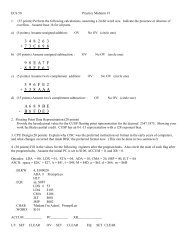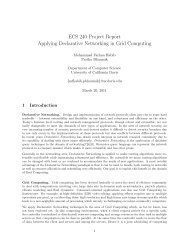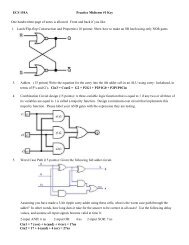Create successful ePaper yourself
Turn your PDF publications into a flip-book with our unique Google optimized e-Paper software.
<strong>E<strong>CS</strong></strong> <strong>50</strong> <strong>Homework</strong> <strong>Assignment</strong> <strong>#2</strong> (100 points) Summer 2014<br />
Due: Monday July 7 th , written at 4pm, programs at 11:59pm.<br />
Filenames: ch3-8.csp, ch4-12.csp, ch5-14.csp, ch5-17a.csp and ch5-17b.csp, ch6-11.csp, ch6-12.csp<br />
You must submit the written answers in the homework box in 2131 Kemper. Each student must submit his/her<br />
own written answers. You must use the handin program to submit the seven programs to the p2 directory of cs<strong>50</strong>. All of<br />
the programs of each team should be submitted from exactly one account. The names of the team members should be<br />
included at the top of ch3-8.csp. You must name your programs the names shown here. Make sure that your programs<br />
may be rerun without reloading the .OBJ file; this means that you must initialize counter variables in the program and<br />
NOT use assembler directives. You will find executables created from my .c files in ~ssdavis/<strong>50</strong>/p2.<br />
Chapter #3 Exercises: 3 a, c; 4 b, d;<br />
Chapter #4 Exercises: 4; 6 a, c; 7 a, c;<br />
Chapter #5 Exercises: 8, 9<br />
Chapter #6 Exercises: 3; 4; 7 b, d; 8 b, d; 9 b, d; 10.<br />
Written (40 points, 2 points for each part)<br />
Programs (60 points, 10 points each except ch5-17a.csp and ch5-17b.csp)<br />
All functions, other than main(), must be register neutral. I have provided C programs for the Chapter 3 and 4<br />
programs in ~ssdavis/<strong>50</strong>/p2. To ease the work of the reader for the programs from Chapters 5 and 6, we will supply the<br />
initial array(s) in the area $A00 to $B06. Do NOT write to this area in any of your code! I have written a C program that<br />
creates a separate file that stores values in $A00. The array we test with may have up to 2<strong>50</strong> elements. You will find<br />
CreateArray.out, and three such array files in ~ssdavis/<strong>50</strong>/p2.<br />
For the two Chapter 5 assigned programs, 14 and 17. We will supply the initial arrays, along with their dimensions<br />
when testing both questions. At the top of both programs you should have the following:<br />
.EQU ROWS, $A00 ; # of rows in the array. Note that the index would be 0 to ROWS - 1.<br />
.EQU COLS, $A01 ; # of columns in the array (not used for #14).<br />
.EQU ARR, $A02 ; Beginning of the initial array<br />
I suggest you copy the following .equ’s to the top of all of the files. You will not be using them all in any program, but it<br />
won’t hurt to have them available.<br />
.EQU PUT_NUM, $E00<br />
.EQU GET_NUM, $E01<br />
.EQU PUT_STR, $E05<br />
.EQU PUT_NL, $E06<br />
.EQU PUT_NUM2, $E07<br />
.EQU PUT_CHR, $E08<br />
Note: The string following a .CHAR directive should be in single quotes, and not double quotes as indicated on page 96 of<br />
the book. For example, for ch4-12.csp you would use:<br />
PROMPT1: .CHAR 'Please enter action', PROMPT1_LEN<br />
1. Chapter 3 #8, Filename: ch3-8.csp Your program should continue to input numbers, construct and display the 24-bit<br />
even parity number until the user enters zero. Make sure that your program can be rerun without reload. You will<br />
find that you will need to store $800000 using the .WORD directive. Use JSR GET_NUM to read the value from the<br />
user, and use JSR PUT_NUM to write the result to the screen.
[ssdavis@lect1 p2]$ ch3-8.out<br />
:255<br />
255<br />
:256<br />
-8388352<br />
:3<br />
3<br />
:4<br />
-8388604<br />
:0<br />
[ssdavis@lect1 p2]$<br />
2. Chapter 4 #12, Filename: ch4-12.csp The C version for this one emulates the 24 bit CUSP OV system and raises<br />
unnecessary issues for our 32-bit systems. So don’t be misled by the manipulating of total at the end of the code.<br />
Your CUSP code will not need that.<br />
3. Chapter 5 #14 Filename: ch5-14.csp You will only use the first “row” of the array ARR as the source for your own<br />
partial summing array, S. The number of entries is given by ROWS. The COLS value is completely ignored for this<br />
program. You need only set aside <strong>50</strong> words for array S. After you have computed S, print it all out on one line, with<br />
each sum separated by one space.<br />
4. Chapter 5 #17 Filenames: ch5-17a.csp and ch5-17b.csp (5 points each) Do not bother creating another array. Just<br />
print out the values of ARR[i, j] * 100 / MAX. As in Figure 5.13, print out each row on a separate line with one space<br />
between each number.<br />
Given the following:<br />
.EQU @, $A00<br />
.WORD 4 ; ROWS<br />
.WORD 2 ; COLS<br />
.WORD 1 ; ARR<br />
.WORD 6<br />
.WORD 3<br />
.WORD 4<br />
.WORD 12<br />
.WORD 25<br />
.WORD 14<br />
.WORD 10<br />
The output of #14 would be:<br />
1 7 10 14<br />
The output of #17 would be:<br />
4 24<br />
12 16<br />
48 100<br />
56 40<br />
5. Chapter 6 #11. Filename: ch6-11.csp Your LOAD procedure should prompt and receive from the user the number of<br />
elements in the array. Then just copy from the array starting at $A00 into your own array. You need not worry about<br />
testing for MAX_N.<br />
6. Chapter 6 #12. Filename: ch6-12.csp You will find cnvtmode.csp in ~ssdavis/<strong>50</strong>/p2, and may copy it into your ch6-<br />
12.csp. There are no changes to the specifications. Just make sure you do not use the area $A00 to $B06 for your<br />
own storage.


